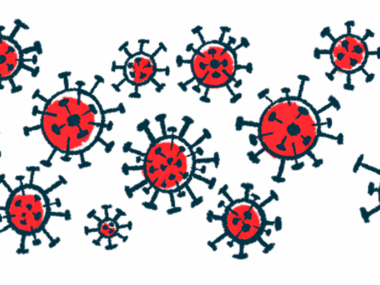Immune responses to ancient viral protein divide active, stable RRMS
About 8% of human genetic code contains HERVs
Written by |

Immune responses against an ancient viral protein called pHERV-W that’s encoded in the human genome are higher in relapsing-remitting multiple sclerosis (RRMS) patients with active disease compared with those who are clinically stable, according to recent research.
The findings offer further support for a link between multiple sclerosis (MS) disease activity and pHERV-W, which has been proposed as a driver of MS-associated inflammation.
Moreover, “these antibody responses could serve as useful biomarkers for monitoring the progression of the disease,” the study’s researchers wrote in “Correlation between antibodies against the pathogenic pHERV-W envelope protein and the inflammatory phase of multiple sclerosis,” which was published in Immunology.
About 8% of the human genetic code is accounted for by human endogenous retroviruses (HERVs), or stretches of genetic material from viruses that embedded into the DNA of our prehistoric ancestors during an infection.
While HERVs have been passed down into the genome of modern humans, they’re not normally activated and live rather latently in the body. Accumulating evidence has indicated they may become activated in certain disease contexts such as MS, however.
It’s believed a family of these viruses called HERV-W are switched on, inducing the production of so-called viral envelope proteins that drive pro-inflammatory behaviors in immune cells. Temelimab, a therapy in development for MS, is designed to reduce this inflammatory response in people with the condition by targeting an envelope protein of this virus.
Immune responses to viral proteins
These HERV-W proteins are found in the blood of MS patients and have been linked to disease activity and progression, according to researchers at the University of Sassari, Italy, who explored whether RRMS patients exhibited signs of an immune response against these viral proteins — as evidenced by antibody production — and if such responses varied based on active or stable disease.
A total of 82 RRMS patients and 46 healthy people, who served as a control group, were recruited at a center in Italy where a blood sample was collected. Among the MS participants, 36 were considered to have stable disease, with no relapses in the previous year, and 46 had active disease, or at least one relapse in that period.
Blood samples for all the participants were incubated with lab-made peptides (protein fragments) of two types of HERV-W envelope proteins — Syncytin-1 Env and pHERV-W Env. The proteins share structural similarities, but have different functional properties.
The antibody response to pHERV-W Env proteins was significantly higher in the blood of RRMS patients with active disease compared to those with stable disease or healthy controls. No differences in antibody production were observed in response to Syncytin-1 Env, however.
Still, a significant positive correlation was observed between anti-Syncytin-1 Env antibodies and anti-pHERV-W Env antibodies in patients with active disease and healthy controls.
Overall, “our study reaffirms the connection between pHERV-W protein and disease severity,” wrote the researchers., who noted the findings are consistent with earlier reports where gene activity related to pHERV-W Env was higher compared with Syncytin-1 Env in RRMS and primary progressive MS patients.
Not all studies agree that HERV-Ws have a causative role in MS, however, and the relationship may vary in different geographical locations where people are genetically distinct.
“To further enhance the findings, it would be beneficial to increase the sample size, include comparisons with genetically diverse populations, and investigate the response of T-cells to these peptides,” the researchers wrote.
T-cells are a family of immune cells responsible for recognizing harmful invaders and launching an immune attack against them. They’re also implicated in MS.
Other viruses, namely the Epstein-Barr virus and human herpesvirus 6, have been linked to MS risk. A direct comparison of immune responses to HERV-W and these other viruses, “could aid in identifying antibody biomarkers that can predict the onset and severity of relapses,” the researchers said.


